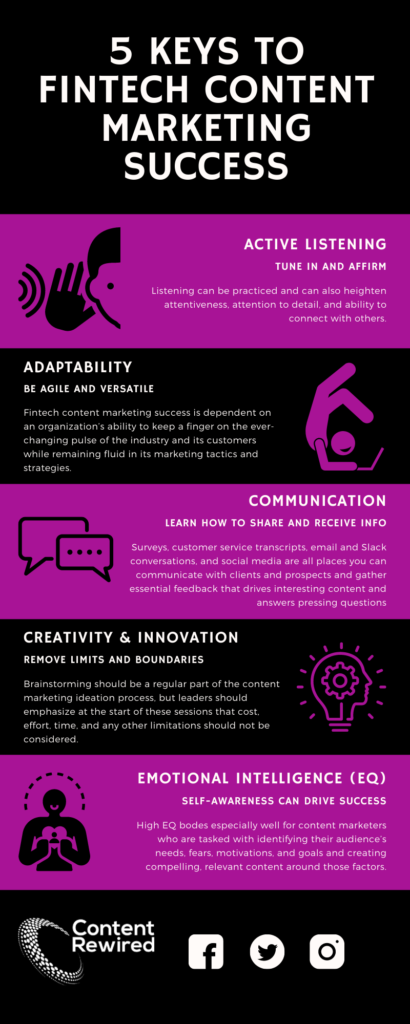Table of Contents
Active Listening
Active listening is a critical component of every type of relationship and conversation. It boils down to three main components: 1) comprehending what the speaker is saying via verbal and non-verbal cues to holistically understand what they are trying to communicate, 2) retaining the information, especially key points, via memory or note-taking, and 3) responding.
These skills apply to both colleague relationships as well as your relationships with clients and prospects. Excellent listening skills are critical to tapping into the needs and wants of your colleagues and understanding the pain points and needs of prospects. Both are important for a well-oiled content marketing machine.
Listening can be practiced and can also heighten attentiveness, attention to detail, and the ability to connect with others. These skills make it much easier to digest information about your audience and use that information as fuel for creating content that resonates and builds trust and credibility with an audience.
Adaptability
Everyone learned about the importance of adaptability in 2020 as the coronavirus threw a wrench in life as we knew it and required a significant pivot across the board. Fintechs are especially knowledgeable about adaptability. Startups must be adaptable and agile to succeed, and many fintechs were able to step in and assist with PPP loans and other digital financial needs more quickly than their incumbent counterparts when push came to shove.
Adaptability and versatility also have a key role in fintech content marketing success. Resistance to change is never a good thing, but embracing it — or even getting ahead of it — can prove beneficial. Fintech content marketing success is dependent on an organization’s ability to keep a finger on the ever-changing pulse of the industry and its customers while remaining fluid in its marketing tactics and strategies.

Communication
If they weren’t already, many fintech organizations have switched to a fully remote work environment. Even a hybrid or completely in-office workplace requires communication to be a top priority. The success of an organization depends upon communication between employees, managers, and colleagues.
Finding new ways to bolster communication when remote continues to be a challenge for some. The Slack outage at the top of this year illustrated just how much many organizations rely on digital channels for critical communication.
Communication is also essential to fintech content marketing success. Great content doesn’t just arise from brainstorming sessions — it comes from the prospects and clients with whom you’re trying to connect. Leveraging surveys, reviewing customer service transcripts, reviewing email and Slack conversations, and interacting on social media are all ways you can communicate with clients and prospects and gather essential feedback that drives interesting content and answers pressing questions.
Creativity/Innovation
Fintechs are no strangers to innovation — they’re built upon it. But how do you take that ability to be creative and translate that into fintech content marketing success? It’s about the process of innovation. Innovation and creativity should be a practice.
Fintech content marketing teams should create an ecosystem that inspires and supports innovation…and not just product innovation. Oftentimes, this means removing boundaries and limits from thought processes. Brainstorming should be a regular part of the content marketing ideation process, but leaders should emphasize at the start of these sessions that cost, effort, time, and any other limitations should not be considered. By freeing people up to think of any solution to a problem or new idea (even unrealistic ones), you open up both the quantity and quality of ideas.
This is where communication and active listening also play an important role. Being a leader in innovation requires teamwork and teamwork requires both of those skills to function effectively. Gather feedback from your team members about what they think is working or not working, what they’re hearing in the field, and where they see room for improvement. Listening without judgment and taking action based on this feedback is the fast-track to identifying gaps in your fintech content marketing program and uncovering new opportunities.
Emotional Intelligence
Emotional intelligence (EQ) is a soft skill that’s hugely underrated — and this is especially true when it comes to B2B content marketing. EQ is tied to several critical factors, including how one receives and provides constructive criticism, direction, and feedback. It’s also a good indication of how difficult conversations will be handled. When it comes to working as a team toward fintech content marketing success, these things are essential.
Beyond that, EQ is extremely important for marketers of all stripes, who rely on more psychology than they may realize when it comes to understanding their audience. High EQ bodes especially well for content marketers who are tasked with identifying their audience’s needs, fears, motivations, and goals and creating compelling, relevant content around those factors. The ability to empathize and sympathize with an audience can make or break a content marketing campaign.



